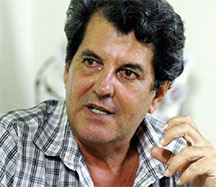US Ambassador to the United Nations Samantha Power deserves credit for asking Cuba’s foreign minister to launch a credible investigation into the suspicious death of leading Cuban dissident Oswaldo Payá, but she should have gone a step further.
Early last week, Power tweeted that she had just raised with Foreign Minister Bruno Rodriguez the need for a serious investigation into the mysterious 2012 car accident in which Payá lost his life.
The prominent Cuban dissident, founder of Cuba’s Christian Liberation Movement, was known worldwide for having organized a petition that gathered more than 25,000 signatures on the island asking for a referendum on whether the Cuban government should allow freedom of speech, and a multi-party democracy.

Payá, whom I had the honour of interviewing many times, was Cuba’s Mahatma Gandhi. He never raised his voice, and consistently preached a message of non-violence and national reconciliation. Many of us saw him as Cuba’s best hope for a post-Castro era.
His death took place on July 22, 2012, after the car in which he was travelling crashed against a tree in Cuba’s countryside.
Payá, 60, and fellow Cuban Harold Cepero, 32, both of whom were in the back seat, were pronounced dead hours later. The car’s driver, Spanish Popular Party politician Angel Carromero, 27, and Swedish political activist Jens Aron Modig, who was seated next to him, survived the wreck.
Carromero was arrested on charges of “vehicular homicide,’’ spent five months in a Cuban prison, and was released on condition of serving the remainder of his sentence in Spain.
After the crash, Payá’s daughter Rosa María Payá told reporters that a Cuban government car had been following the group and repeatedly slammed into Payá’s car from behind, driving it off the road and into a tree. She said the two European visitors had sent text messages to friends in Europe from the site of the accident, telling them that their car was being followed.
But her story could not be backed up by hard evidence at the time. The two Europeans were kept at a Cuban prison, away from reporters, and Carromero had signed a Cuban government affidavit backing the government’s version of events.
Worse, Carromero had a history of bad driving: he had accumulated 45 traffic tickets in Spain over the 15 months before his trip to Cuba. And Modig told reporters that he had been asleep when the accident occurred.
But the Payá family’s story began looking much more credible a few months later when, back in Spain, Carromero told The Washington Post on March 5 that he had signed the Cuban affidavit under duress, and that Cuban secret police cars — with their blue licence plates that characterize them — “were following us from the beginning.”
Carromero said that the last time he had looked back in the mirror before losing consciousness, “I realized that the car had gotten too close — and suddenly I felt a thunderous impact from behind.”
In a subsequent interview with the Spanish daily El Mundo last week, Carromero said that Payá and Cepero had survived the crash and were taken to a hospital, where “Cuba’s secret services killed him.”
Adding to the latest revelations, El Mundo published pictures of the original text messages sent by the two Europeans from the site of the accident. Payá’s daughter Rosa María posted the pictures at her father’s website, OswaldoPayá.org.
In a telephone interview, Rosa María Payá told me that her family has requested an international investigation by the United Nations Special Rapporteur for extrajudicial killings, and the Organization of American States’ Human Rights Commission. It is also pursuing the case in Spanish courts, since Payá also held Spanish citizenship.
Asked about Power’s request to the Cuban foreign minister, Rosa María said it’s a “good first step, but the Obama administration should take the petition to UN Secretary General Ban Ki-moon and to the UN Special Rapporteur of extrajudicial killings. As far as I know, they have not done that yet.”
My opinion: I agree — Power should be commended for raising this issue. But instead of requesting a credible investigation to the Cuban foreign minister — we all know how that will end — she should take it to the UN, the Organization of American States and other international institutions. There are now too many pieces of evidence, including the original text messages and two eyewitnesses, to close the book on the highly suspicious death of one of Latin America’s biggest civil rights heroes.
© The Miami Herald, 2013. Distributed by Knight Ridder/Tribune Media Services.




